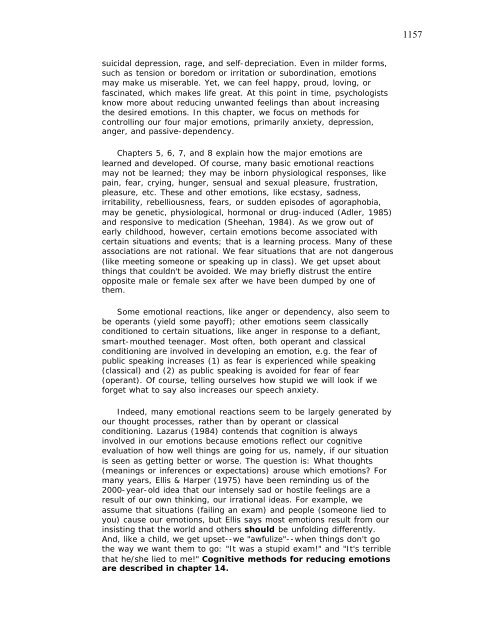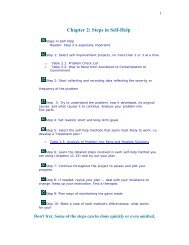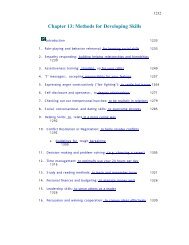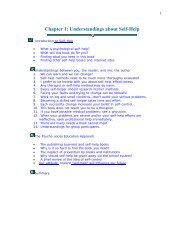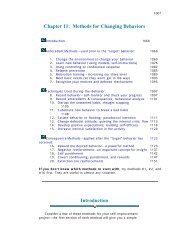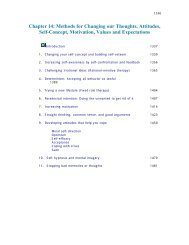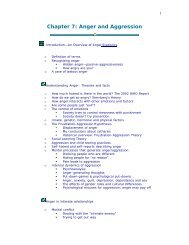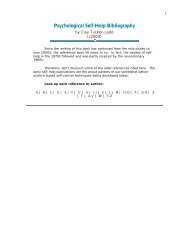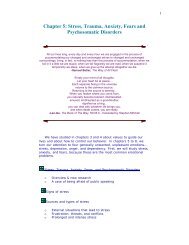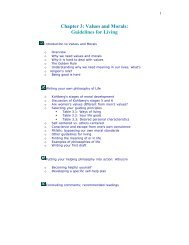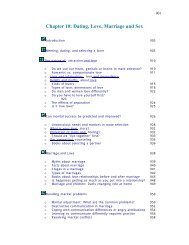Chapter 12: Methods for Changing Emotions - Psychological Self-Help
Chapter 12: Methods for Changing Emotions - Psychological Self-Help
Chapter 12: Methods for Changing Emotions - Psychological Self-Help
You also want an ePaper? Increase the reach of your titles
YUMPU automatically turns print PDFs into web optimized ePapers that Google loves.
1157<br />
suicidal depression, rage, and self-depreciation. Even in milder <strong>for</strong>ms,<br />
such as tension or boredom or irritation or subordination, emotions<br />
may make us miserable. Yet, we can feel happy, proud, loving, or<br />
fascinated, which makes life great. At this point in time, psychologists<br />
know more about reducing unwanted feelings than about increasing<br />
the desired emotions. In this chapter, we focus on methods <strong>for</strong><br />
controlling our four major emotions, primarily anxiety, depression,<br />
anger, and passive-dependency.<br />
<strong>Chapter</strong>s 5, 6, 7, and 8 explain how the major emotions are<br />
learned and developed. Of course, many basic emotional reactions<br />
may not be learned; they may be inborn physiological responses, like<br />
pain, fear, crying, hunger, sensual and sexual pleasure, frustration,<br />
pleasure, etc. These and other emotions, like ecstasy, sadness,<br />
irritability, rebelliousness, fears, or sudden episodes of agoraphobia,<br />
may be genetic, physiological, hormonal or drug-induced (Adler, 1985)<br />
and responsive to medication (Sheehan, 1984). As we grow out of<br />
early childhood, however, certain emotions become associated with<br />
certain situations and events; that is a learning process. Many of these<br />
associations are not rational. We fear situations that are not dangerous<br />
(like meeting someone or speaking up in class). We get upset about<br />
things that couldn't be avoided. We may briefly distrust the entire<br />
opposite male or female sex after we have been dumped by one of<br />
them.<br />
Some emotional reactions, like anger or dependency, also seem to<br />
be operants (yield some payoff); other emotions seem classically<br />
conditioned to certain situations, like anger in response to a defiant,<br />
smart-mouthed teenager. Most often, both operant and classical<br />
conditioning are involved in developing an emotion, e.g. the fear of<br />
public speaking increases (1) as fear is experienced while speaking<br />
(classical) and (2) as public speaking is avoided <strong>for</strong> fear of fear<br />
(operant). Of course, telling ourselves how stupid we will look if we<br />
<strong>for</strong>get what to say also increases our speech anxiety.<br />
Indeed, many emotional reactions seem to be largely generated by<br />
our thought processes, rather than by operant or classical<br />
conditioning. Lazarus (1984) contends that cognition is always<br />
involved in our emotions because emotions reflect our cognitive<br />
evaluation of how well things are going <strong>for</strong> us, namely, if our situation<br />
is seen as getting better or worse. The question is: What thoughts<br />
(meanings or inferences or expectations) arouse which emotions? For<br />
many years, Ellis & Harper (1975) have been reminding us of the<br />
2000-year-old idea that our intensely sad or hostile feelings are a<br />
result of our own thinking, our irrational ideas. For example, we<br />
assume that situations (failing an exam) and people (someone lied to<br />
you) cause our emotions, but Ellis says most emotions result from our<br />
insisting that the world and others should be unfolding differently.<br />
And, like a child, we get upset--we "awfulize"--when things don't go<br />
the way we want them to go: "It was a stupid exam!" and "It's terrible<br />
that he/she lied to me!" Cognitive methods <strong>for</strong> reducing emotions<br />
are described in chapter 14.


